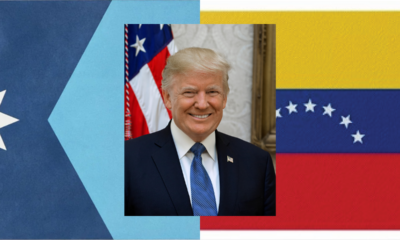Constitution
Greater Idaho fights inertia
Greater Idaho now faces its greatest enemy: inertia, born of unwillingness to consider new ideas, and contempt for liberty.
The Greater Idaho Movement was merely a curiosity outside of eastern Oregon. Except for proponents of interstate or even international secession, no one paid it any heed outside of eastern Oregon. Within eastern Oregon, of course, it was likely Topic A. Eleven counties, out of fifteen whole (or nearly whole) counties east of the Cascade mountains, have voted for it. But only after the Idaho House of Representatives passed a resolution of invitation did anyone else take it seriously. Now that it has, many more people are talking about it. And inertia, born of resentment of the very idea of interstate secession, now emerges as its chief obstacle.
Before we begin, CNAV salutes the Greater Idaho organization for sharing our earlier article on their Twitter feed.
Definition
Note that the instrument of invitation that passed the House of Representatives, and the instrument of secession that a sympathetic Senator introduced in the Senate of Oregon, are both called joint memorials. The American Heritage Dictionary defines a memorial, in legislative usage, as:
A written statement of facts or a petition presented to a legislative body or an executive.
The United States Congress, and most State legislatures, pass resolutions when they are not passing laws. The legislatures of Oregon and Idaho, and their respective chambers, are taking up memorials in relation to Greater Idaho. Perhaps this kind of “memorial” is appropriate, because the Boards of Supervisors of eleven counties in one State have petitioned for secession from their home State and admission to a neighboring State. Or perhaps in Oregon and Idaho, and in other States, memorial substitutes for resolution wherever another State uses that term.
In any case, House Joint Memorial One passed the Idaho House by a vote of 41-28. Likewise, the Senate of Oregon is now considering Senate Joint Memorial Two. Of the two, Idaho HJM 1 is far more significant. Under the U.S. Constitution, no movement of interstate secession can succeed without the invitation of the legislature of the State any particular group of secessionists wish to join. Idaho House Joint Memorial One constitutes the invitation to Greater Idaho.
Greater Idaho – where it stands, where it wants to head
The Greater Idaho Movement proposes two phases of interstate secession, as its map page shows. Phase One draws a line across Oregon along the Cascade Mountains. It would include the counties of Baker, Crook, Gilliam, Grant, Harney, Lake, Malheur, Morrow, Sherman, Umatilla, Union, Wallowa, Wheeler, and the eastern parts of Deschutes, Jefferson, Klamath, and Wasco Counties. Phase Two would add the rest of Klamath County, plus Coos, Curry, Douglas, Jackson, and Josephine Counties in Idaho, plus Lassen, Modoc, Shasta, Siskiyou, and Tehama Counties and portions of Butte and Plumas Counties in California, and Asotin, Columbia, and Garfield Counties in Washington State. Greater Idaho does not plan to include Bend, Oregon, in Deschutes County.
Thus far, Baker, Grant, Harney, Jefferson, Klamath, Lake, Malheur, Morrow, Sherman, Union, and Wheeler Counties have voted Yes. Wallowa County will vote on secession on May 23. Crook, Deschutes, Gilliam, Umatilla, and Wasco Counties have not scheduled any votes. Josephine and Douglas Counties voted against secession, which is why Greater Idaho adopted its two-phase plan.
The Idaho House, of course, has sent its invitation. Next, the Idaho Senate considers its invitation. Governor Brad Little (R-Idaho) claimed bragging rights. Whether that will translate into an invitation of his own, will wait for the Senate to pass HJM 1. Thus far the Oregon Senate has taken no action on the measure (SJM 2) introduced in that chamber.
Greater Idaho – neutral coverage…
The Idaho Press has the closest thing to neutral coverage. They quoted Reps. Barbara Ehardt (R-Idaho Falls) and Judy Boyle (R-Midvale), who introduced the invitational resolution. Rep. Ehardt emphasized land and resource acquisition for Idaho. Rep. Boyle emphasized moving the Idaho-Oregon border further west, to buffer the existing population against Oregon’s drug problems. Oregon has legalized marijuana and is working on legalizing hard drugs. Idaho has legalized cannabidiol (“marijuana oil”), which is not psychoactive, and also legalized hemp (as opposed to Cannabis sativa L.). Tetrahydrocannabinol, the active hallucinogen in marijuana, remains illegal in Idaho.
Rep. Ilana Rubel (D-Boise), Minority Leader, suggested that Idaho would be welcoming in several Medicaid and free-lunch cases. Idaho, she said, would have to pay for these. She further suggested that inviting in the Oregonians would be tantamount to Balkanizing the country. KGW-TV quoted her more extensively:
We should not be self-segregating by ideology like this. I think we’re on a path to civil war if we keep going down this path. We have got to learn to get along better and work together better. The answer cannot be to carve up the country and redraw lines that have been in place for a century or more, just so we can only be surrounded by people that perfectly agree with us.
Rep. Ned Burns (D-Bellevue) protested that the legislature should first pass property tax relief and a budget. Rep. Greg Lanting (R-Twin Falls) expressed fear of creating oversized legislative districts. (Idaho may currently have only 35.)
… and the hyenas
Willamette Week quoted U.S. Rep. Earl Blumenauer (D-Ore.) as saying he would support the deal if Idaho would cede Boise. That expresses the tone of some of the other local organs, whose editors seem to be laughing like hyenas. Randy Stapilus of The Lewiston Tribune said Idaho would not gain a House seat, and Oregon would flip its Second and Fifth Districts from Republican to Democratic. But he counted only the eleven current Yes votes. Maybe no one told him that Greater Idaho wants at least fifteen Yes votes, that would represent 380,000 people, not 208,800. Interestingly, Stapilus hinted that Idaho was on track to get its third House seat in the 2030 census anyway. Well, if Idaho won’t take it away from Oregon, then they’ll take it away from another State. Stapilus also talked about Idaho’s sales tax, which Oregon supposedly does not have. Hold that thought! CNAV will address that later.
Idaho State Public Radio quoted the same people the Idaho Press did, and to the same effect. Clark Corbin of the Idaho Daily Sun, in an article in the Bonner County Daily Bee, also used gallows humor. “With a wink and a smirk” was how he characterized the passage of HJM 1. But he did take note that the people of eastern Oregon feel western Oregon does not represent them anymore.
Astonishing ignorance
Betsy Johnson, a former candidate for governor of Oregon, at least asked the right question:
What has made it so bad that they are prepared to go through the administrative and expense and political hassle of trying to separate a piece of Oregon and move it into Idaho?
Much of the other statements bespeak sheer ignorance. First, take Rep. Rubel’s assumption that absorbing Oregon east of the Cascades would be a drain on Idaho. To be sure, that region does not today return as much in taxes as it costs the State in expenditures. And yes, those expenditures include Medicaid and school lunches as well as extensive State roads. And some have alleged that those counties would lose income from the forced closure of the weed (and head?) shops, that are illegal in Idaho. Let’s assume they will, for the sake of argument. Did no one tell these hyenas about the business opportunities the eastern Oregonians would gain from joining business-friendly Idaho? The Claremont Institute estimates that the region could see a 2.1 percent jump in Gross Domestic Product after the move.
Economic impact
That wouldn’t come about right away. Claremont estimates that Idahoans would have to pay $42 per capita to welcome in the Oregon counties. (Whereas Northwestern Oregon would save $363 per capita.) But then consider these points:
- “taxing industrial developments that would not otherwise have materialized in Oregon.”
- “$1.8 billion in net-new economic activity, $504 million in labor income, and the addition of 9,965 jobs.”
Those job holders, of course, would not be on Medicaid or getting free lunches for their children.
Furthermore, Douglas and Josephine Counties might want to re-think their No votes. They would benefit from Phase Two to the tune of $163 million (Douglas) and $124 million (Josephine). That’s an awful lot of moolah at which to turn up one’s nose for the sake of “woke” ideals. (In fact, Americans used to call that sort of thing “to cut off one’s nose to spite one’s face.”)
More to the point, those counties could pay for themselves – and they might even improve the economy of present-day Idaho.
And why does Idaho bid fair to pick up a House seat? Because people are flocking to Idaho to take advantage of economic opportunities simply not available in “blue” States.
Finally, about that cap of 35 districts: the people of a new Idaho could change that. Quibbling about such details ill befits a representative of the people.
Balkanize and build
Andrew Torba, of Gab fame, now urges conservatives to “balkanize and build.” Apart from that, Rep. Rubel has no room to protest what she calls “self-segregation by ideology.” First, her idea of “getting along” and “working together” likely means extending her brand of “woke” policies everywhere, so conservatives would have no place to go. That is why she is Minority Leader in the Idaho House of Representatives. Hers is the bankrupt ideology. And as Lincoln Brown of Pajamas Media points out, she knows she would be in a further minority, should Idaho annex Oregon’s eastern counties. Brown’s further criticism is even more scathing:
Well, gee whiz, Representative. If you feel that way about it, why not move to Portland where you will enjoy a solid majority? I hear Portland is lovely in the spring when the arsonists, vandals, and looters come out of hibernation, the first window of the year is broken and the smell of the spray paint from fresh graffiti fills the air. The first shipments of fentanyl are arriving, and the weed is in full blossom. I understand that the morning sun looks majestic as it plays across the needles in the streets and the winds of social change gently sway the tents in the homeless encampments. And that is all before the first fire of the season is lit.
Dr. Steve Turley points out that, without the Democratic votes in Multnomah County, Governor Kate Brown would have lost reelection. Portland is Multnomah’s county seat.
Go Greater Idaho!
Betsy Johnson at least meant well. In fact, 81 percent of residents of the Willamette Valley want their State government to talk to the residents of the eastern counties and find out what’s troubling them. (As if neither they nor anyone else could guess!) But talk is cheap. That “administrative expense” would pay for itself, as the Claremont Institute assures everyone. And the “political hassle” is nothing compared to the grinding tyranny of “woke-ism” those residents must now endure. Oregon’s woke dictators – one can call them nothing else – keep those people from realizing their full economic potential. In fact, U.S. Senator Jeff Merkley (D-Ore.) boasted of denying economic opportunity, by forbidding new “fossil fuel infrastructure.”
And what does the Portland-Salem-Eugene Axis do next? They throw sops to their eastern population by letting them run weed shops and possibly head shops. The resulting crime cancels out any possible economic benefit from that. Rep. Judy Boyle of Midvale told the Idaho House State Affairs Committee about that crime.
Dr. Steve Turley said it best: the Idaho-Oregon border is functionally obsolete, of only historical significance. The facts behind that history have disappeared. In their place have come new, brutal facts. Oregon is destroying itself as a State while Idaho thrives. Interstate secession can at least save the eastern counties. And those who complain of “self-segregation by ideology” have none to blame but themselves, for promoting a toxic ideology.
Terry A. Hurlbut has been a student of politics, philosophy, and science for more than 35 years. He is a graduate of Yale College and has served as a physician-level laboratory administrator in a 250-bed community hospital. He also is a serious student of the Bible, is conversant in its two primary original languages, and has followed the creation-science movement closely since 1993.
-

 Accountability2 days ago
Accountability2 days agoWaste of the Day: Principal Bought Lobster with School Funds
-

 Constitution2 days ago
Constitution2 days agoTrump, Canada, and the Constitutional Problem Beneath the Bridge
-

 Executive21 hours ago
Executive21 hours agoHow Relaxed COVID-Era Rules Fueled Minnesota’s Biggest Scam
-

 Civilization20 hours ago
Civilization20 hours agoThe End of Purple States and Competitive Districts
-

 Civilization4 days ago
Civilization4 days agoThe devil is in the details
-

 Executive4 days ago
Executive4 days agoTwo New Books Bash Covid Failures
-

 Civilization4 days ago
Civilization4 days agoThe Conundrum of President Donald J. Trump
-

 Executive4 days ago
Executive4 days agoThe Israeli Lesson Democrats Ignore at Their Peril














